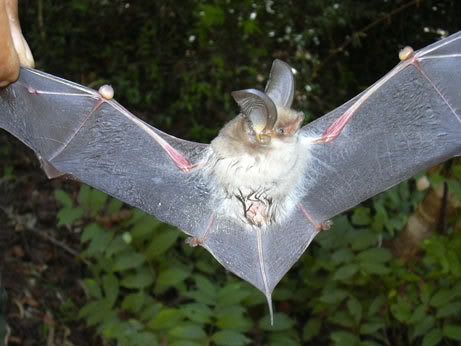Potentially creepy "Brave New World" sort of stuff, check this out:Scientists create glowing monkey, WASHINGTON -- Pushing science to the brink of altering humans, scientists have created the world's first genetically modified primate -- a rhesus monkey with jellyfish DNA that glows in the dark.
The advance suggests the possibility of making customized primates for medical research. Researchers said they hoped the technique would help them produce monkeys with Alzheimer's disease, breast cancer and other ailments against which new therapies or vaccines may be tested.
``There are fantastic discoveries now being made from studies of human diseases in mice,'' said Gerald Schatten, who with Anthony W.S. Chanled the research at the Oregon Regional Primate Research Center in Beaverton. ``We're optimistic that genetically modified primates can translate some of those discoveries in mice safely and swiftly to people.
'Mice have been genetically modified in labs and used for medical research for decades, but the new research proves that scientists can now successfully tinker with the chromosomes of a close genetic cousin to man.
``This is a step in the direction of working with an animal that is closer in biology to humans,'' said Dr. Phyllis Leppert at theNational Institutes of Health, which funded the research.
She said mice have their limits when scientists try to apply experimental results to humans. Rhesus monkeys, however, share roughly 95 percent of their genes with humans, she noted.
Although the approach has proven very useful for genetic research, ithas stirred fears that similar techniques might someday be used to add desirable traits to human embryos, heralding a new era of
"designer babies.'' (scary!)Already, many fertility clinics offer tests that allow parents to choose embryos free of unwanted traits (such as disease genes) or carrying desirable traits (such as a tissue type that will make the newborn a useful organ donor for a sibling). But although some coveted human genes have been discovered, no one has actually inserted such agene into a human embryo. That's because of ethical concerns -- and because there has not been a monkey model on which to practice.
The gene-altered monkey, born in Oregon last October and described intoday's issue of the journal Science, is endowed with jellyfish genes.The jellyfish DNA has no medical value but is a popular tool with genetic engineers because it makes animals glow green when they're exposed to blue light, offering quick and dramatic evidence that agene-transfer method works.
"What is of interest, I think, in Gerry Schatten's work, is thepossibility that one could learn about certain types of diseases inways that we really couldn't in humans,'' said Patricia Backlar, anethicist at the Oregon Health Sciences University. "But there's also the issue there that maybe we shouldn't do this on non-human primates,'' she said. "That's an issue. I can't resolve it for you.''
Some critics opposed to genetic modification of human kind's close cousins are concerned about a slide down a slippery ethical slope."Before it was mice. Now, monkeys -- both cloned and gene-altered,'' said Eric Kleiman, research director of Defense of Animals, an international animal advocacy group based in Mill Valley, Calif.
"It's pretty clear who is next. And it will be just as reprehensible when people are manufactured to suit experimenters."Schatten said he opposed any human applications.
To engineer the monkey, Schatten's team stuffed copies of a foreign gene into specialized viruses and injected those viruses into hundreds of unfertilized monkey eggs.
The method is not very efficient. Of 222 gene-altered eggs, 126 grewinto embryos in laboratory dishes. Of 40 embryos that were transferred to 20 surrogate mothers (two embryos per mother), just five pregnancies resulted -- one of them twins. Of those six fetuses, three were born live. And only one of those -- named ANDi, a backward abbreviation for "inserted DNA'' -- contained any jellyfish genes.
"This is proof of principle,'' Schatten said. "The jury is still outas to how or even if non-human primates should contribute to thediscovery of molecular medical cures.''









